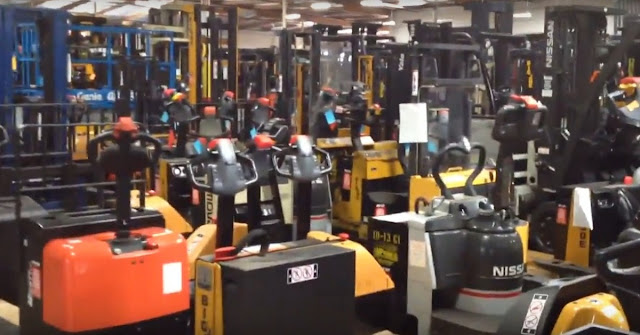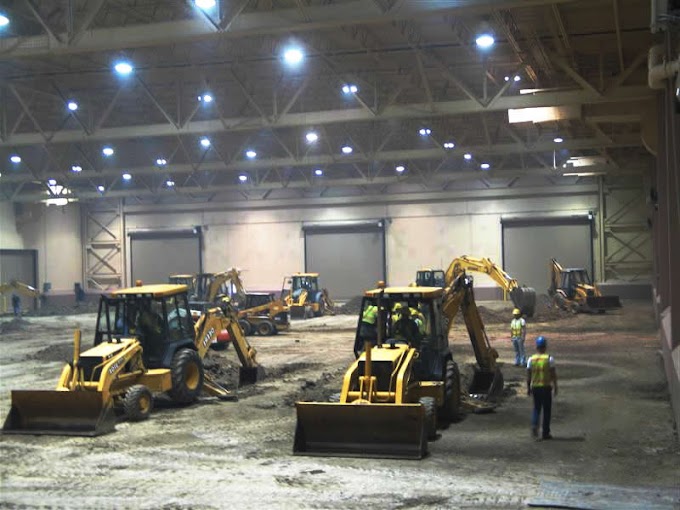 |
| Choose thr right forklift |
If you decide to rent, lease or buy a forklift, of course want to choose the best forklift there are so many brands, resellers and options that can make the decision difficult and complicated. Here are some simple things to consider helping you out of the business with the equipment you need, at the right price, as well as great after-sales service.
What is capacity and why do you have to know that?
The nominal capacity of a forklift is the amount of weight it can lift. The capacity of the lift truck can be found on the device nameplate with further important information. Note: the more you lift a load, the lower the capacity. Adding an attachment also affects the capacity of the device. Most of the capacity is classified in a 24 "l oad center, and before deciding which forklift you should buy or rent, you should be aware of the weight and size of the loads you want to lift, as the number of used forklifts varies 3,000 and 6,000 pounds, however, forklifts can be between 2,000 and 65,000 pounds or more.The more you can lift the device, the more expensive it will be. Capacity unit that you not only need to make sure you do the work, but sure to use a forklift with Insufficient capacity can damage the products you lift and can endanger the lives of operators and people in your area.
Lift height and capacity
In addition to capacity, you also need to know how much your equipment needs to be raised and if you have height restrictions. The lift height can be critical when working on projects with more than 188 "-189" that are typical for a three-tiered tab. "Quad" units have a control mast to lift them to heights of 240 "or more. There are doors or low ceilings in the building where you work or in the trucks you load / unload.
What is my request? How can I choose my forklift?
When choosing a forklift, one of the first questions to ask is: "What is this forklift used for and where is it used?" The answer to this question is your request. How to use it: stacking pallets, moving large rolls of paper, carpets or tree trunks, pipes? The possibilities are endless. Where do you make the main elevator: in a warehouse, out on asphalt, gravel, mud, grass, in the forest? The product that you move and the type of environment in which you work determine your application. The type of application you have determines some specifications of your forklift, such as the type of fuel, tires and accessories you need. If you work in an environment in which certain security precautions must be taken, contact your dealer for equipment with a specific security level. If you work outdoors in grass or mud and need to lift heavy loads, ask your dealer for off-road and all-wheel drive units.
Attachments
There are different mounting options for your forklift. Cardboard clamps, swing clamps, side shifters, marble staples, drum collectors, drum manipulators, carpet rods, pushers, fork positioners and hydraulic clamps are all examples. Once you have determined your capacity and application with your distributor, find out about the attachments and if they might be useful. Special accessories can also increase the residual value of your device. When purchasing a unit with multiple features or accessories, consider a forklift with a fourth control lever. Talk to your dealer about which mounting options are best for you.
Fuel Options
You also have several fuel options to consider when choosing a forklift: electric, gasoline, LPG, diesel and dual gasoline or LPG. With your app you can determine which fuel source you choose and what costs and preferences you want. If you work in a closed system, it is unlikely that you will need an incinerator because of the exhaust air. An electric forklift would be ideal. However, electric forklifts are usually more expensive to buy and their batteries require special chargers as well as special care and maintenance. If you need a heavy forklift, it's probably diesel. Dual-fuel trucks offer flexibility and mobility, because if you run out of fuel, you can simply upgrade the unit to LPG to complete the job. The cost and availability of fuel must be taken into account, as this will be a necessary cost during the life of your forklift.
Tire options
Forklifts have many tire options. Upholstery, compressed air, solid tires and foam are just a few examples. Again, knowing your application helps to find the right tire for your forklift truck. If you work mainly indoors, on asphalt or cement, a soft-cushion tire will work. These tires are also available in a style that leaves no marks, thus preserving the black spots on the floor. If you work outdoors on coarse asphalt, gravel, mud or grass you will need a pneumatic tire. These tires have a true profile and provide more cushioning between the forklift and the ground. Remember that forklifts do not have their own suspension. The tires in your device can greatly affect the comfort of your drivers. Spare tires that take longer are also available. Consult your local dealer for your best options.
Guarantee
Reputation: It is strongly recommended to choose a local forklift dealer. You want a company that has been established in your region for some time and that arouses much interest in your community. Local distributors are much more likely to be able to support their equipment and do what they can do for you as a customer, because your reputation is at stake. If you buy equipment outside the city, on the Internet, or if an auction, The person who sold it to you will not really care if you complain to your colleagues about the wrong machine that caught you. If you choose a local dealer, you can also help your community and keep your business and money at home, from which any city can benefit.
Maintenance and service
We compare the purchase, lease or rental rates so quickly that we easily neglect the cost of maintaining our forklift trucks. This can lead to long-term problems. Manufacturers recommend services that must be carried out at certain intervals in their devices. Consult your dealer for planned maintenance and periodic maintenance options. Scheduled maintenance is usually scheduled every 200 hours or 30 to 120 days, depending on the usage of your device. This service includes oil and filter replacement, fluid control, lubrication, and other maintenance, depending on your device type. Periodic maintenance is less common and covers differential fluid changes as well as other less routine maintenance work and occurs about once a year or every 2000 hours. A good dealer will provide regular and regular maintenance kits for your forklift truck and will arrive at your location on a regular basis to carry it out. This also gives the technician the ability to detect and correct existing and potential problems before they cause major errors. When you rent a forklift, you have the option to purchase a complete maintenance program and have the dealer take care of everything or have the unit repaired by you. The last option, although saving you money, can end up costing you if you return the case with broken parts. If you rent a forklift for a short-term lease, the dealer must take
Reputation: It is strongly recommended to choose a local forklift dealer. You want a company that has been established in your region for some time and that arouses much interest in your community. Local distributors are much more likely to be able to support their equipment and do what they can do for you as a customer, because your reputation is at stake. If you buy equipment outside the city, on the Internet, or if an auction, the The person who sold it to you will not really care if you complain to your colleagues about the wrong machine that caught you. If you choose a local dealer, you can also help your community and keep your business and money at home, from which any city can benefit.
Quality: Forklift trucks are not cheap. These are large parts of application-specific machines that have a considerable price. If your business or project is at the point where you need a forklift, you want to make sure you make the best possible investment. Research a little in advance and get a general idea of what you want to help. Search the Internet for forklift testing and see what's reported about the brands. Some brands cost more but last longer or offer better warranties, options or residual values. Some brands are cheaper because they cost less in the long run. Whether you choose a simple forklift or unit with all the amenities, you want to make sure you get what you pay for. Bring the search results you found to your local dealer and discuss them. If you are for a particular brand or model, but there are mixed reviews, be honest with the seller and ask what happened to them.
Sales Process: From start to finish, buying, renting or leasing a forklift needs to be as easy as possible. This is another reason why working with a local dealer helps you. Direct conversation with a salesperson who knows the team he represents can make a difference in the world. Various forklift trucks, accessories and tire options, financing, warranty and maintenance must be covered before you are asked to make a decision. A good forklift salesman will go out of his way to get the right equipment in the best conditions and to track it after the sale.
After-Sales Resources: These are points to consider after the sale. Does this dealer have their own parts department? If you store your own parts, you may be able to repair your device faster if it breaks. This should include tires. Does this dealer have a rental service? If your device falls and you need to have something in place, it's much easier to get a short-term lease from the company that repairs your equipment than to buy it yourself. In addition, checking the dealer's rental fleet before purchasing can help you choose the make and model. For market resources, you can also add various elements to help you with other aspects of managing your hardware, including storage and storage systems.
Serviceability: Your dealer's service capabilities help you maintain your device. The scheduled and periodic maintenance of your forklift and the manufacturer's recommended performance must be provided to you when you purchase your forklift. What is the Reseller Service Response Time? Will they repair the device in a few hours or days? Are your technicians certified and trained? Do not be afraid to ask questions!
Customer Service: This last feature is perhaps the most important. Once you have purchased a forklift from your local dealer, you must expect quality and continuous customer service. No one company can fix it for you right away, but the distributor you choose should do everything to help you. You should have a friendly and helpful staff as well as convenient opening hours. Planning a service call, ordering a hire or parts must be a simple and complicated process. Local distributors will only thrive if their customers do so, so it should be a priority for them to take care of them.



1 Comments
Very informative. Thanks for sharing
ReplyDelete